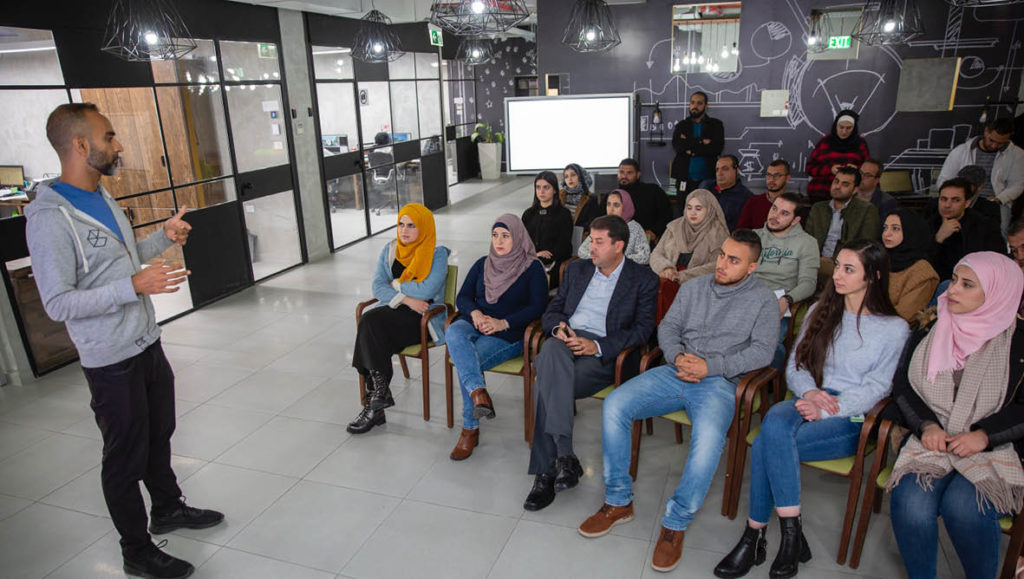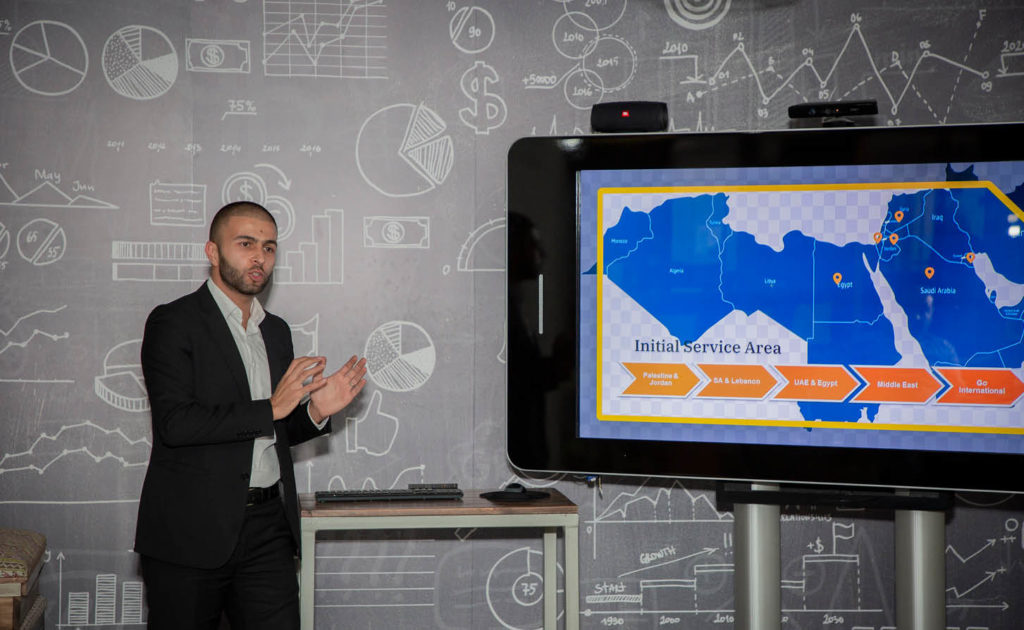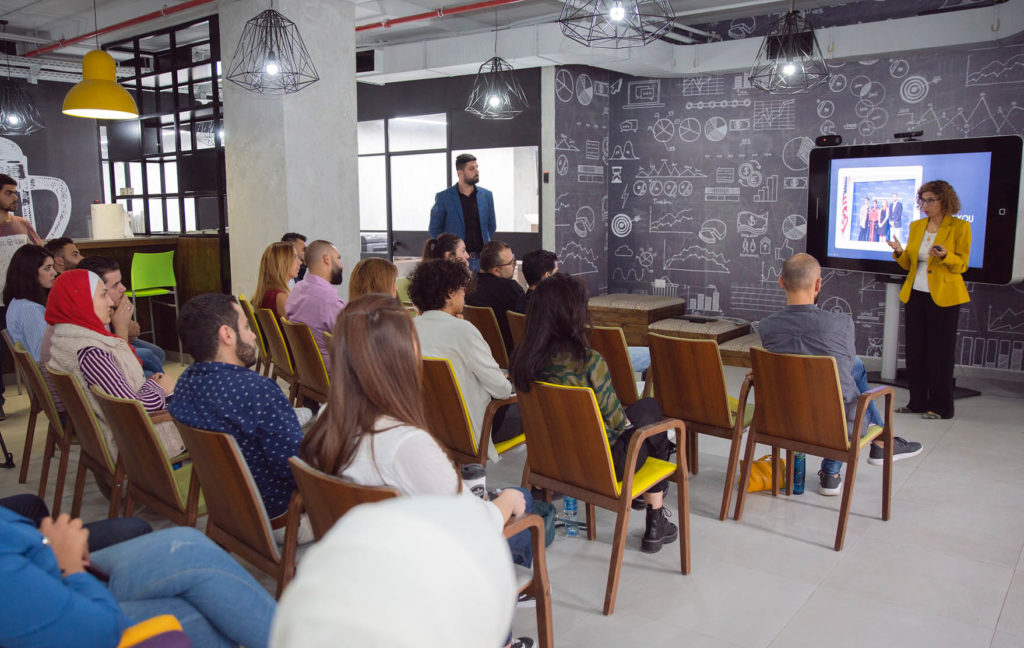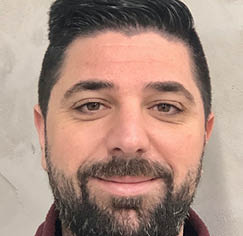
Most Palestinians know by now of Rawabi and the opportunities it provides for home ownership, employment, education, and entertainment, including concerts, shopping, dining, and outdoor fun. What people may not know is that Rawabi, from its inception, intended to build itself into the hub of Palestine’s new “knowledge economy.”
Palestine today lacks most of the traditional building blocks of economic prosperity: natural resources, border access, a strong manufacturing base, an enabling political environment. Deciding to create change rather than wait for it, Rawabi’s developers took a hard look at Palestine’s strengths – a young workforce, educated and mostly English-speaking, several universities with excellent STEM curricula, and a gradually strengthening IT sector. The answer was obvious: Rawabi would position itself to become the nucleus of Palestine’s high-tech sector and, ultimately, a hub for the entire region.

Rawabi’s world-class fiber-optic utilities network and security infrastructure are a great benefit for its new homeowners. But they serve a larger purpose as well: a foundation from which Palestinian enterprise will connect with the global technology market. Software development, fintech, cloud solutions, database management, mobile technologies, outsourcing… the information technology sector is adding new specializations every year.
To harness this growing potential, the Rawabi Foundation was created. A registered 501 (c) (3) nonprofit, its mission is to generate sustainable employment opportunities for Palestinians by attracting start-ups, local companies, and multinational corporations to base operations in Rawabi. The foundation works proactively with other thought leaders such as CLUJ IT Cluster in Romania and the DMZ at Ryerson University in Canada, forming mutually beneficial partnerships to help foster growth and build bridges to the international IT community.
Imagry is building the world’s first “mapless” autonomous driving platform. Its approach fundamentally transforms autonomous mobility from research to commercialization by pushing the limits of computer vision and AI. The customary way to fully operate autonomous vehicles is to use HD mapping that requires a strong connection to satellite GPS and continuous effort to update the map. Imagry’s mapless autonomous driving platform eliminates the need for this costly and time-consuming technology.
The foundation helped form COnnect, a unique co-working space designed to inspire innovation, cultivate creativity, and promote productivity. Its state-of-the-art shared workspace facility offers private offices, open desks, meeting rooms, phone booths, and a full range of business equipment and technical support. COnnect hosts enterprise events for Google for Startups, SAP, SLUSH, Forbes 30 Under 30, and Microsoft, and holds lectures, competitions, hackathons, and workshops open to the public.
As an expert in small-business growth, COnnect provides mentorship, access to capital and financing, and a range of technical resources to help bring to life great ideas, such as Imagry, working in the driverless car space; AD3, specializing in architectural visualization; and CYKEEP, a cybersecurity firm.

Another foundation program is Bader, a technology fund and ICT incubator, which offers value-added services in a business-enabling environment to drive innovation and promote productivity. With a significant capital endowment for seed funding, Bader is well-positioned to help promising Palestinian tech enterprises chart a path to sustainable profitability. Bader experts assist entrepreneurs with business-model development, building professional networks, and global market outreach.
AD3 is an architectural services firm that provides architectural design, supervision, 3-D visualization and animation services. In addition, AD3 provides architectural lighting design, including projection mapping.
The foundation is working on a training institute that offers internationally accredited programs in addition to other sponsored programs by tech giants such as Google and Microsoft to certify Palestinian engineers and programmers for careers in the global high-tech industry. Furthermore, business management and operations courses will be available to supplement technical training, such as the mini-MBA course by Dartmouth College’s Tuck School of Business (United States), offered in Rawabi, Palestine.

Cykeep is on mission to redefine cyber security by developing the next generation of anti-malware solutions, network-security solutions, and cloud-security solutions using deep learning to ensure better protection and more effective solutions than those currently available.
Professional partnerships and strong networks take time to build. Working through the foundation, Rawabi hopes to make significant contributions to the infrastructure of Palestine’s new knowledge economy.


